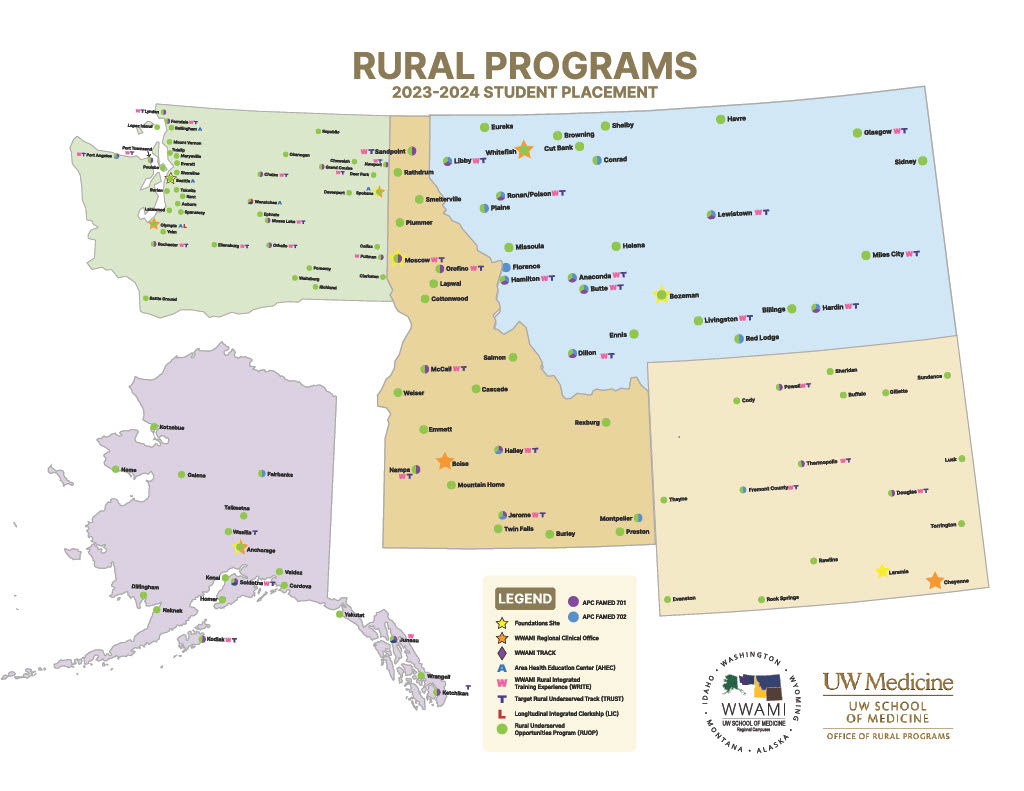WRITE
WWAMI Rural Integrated Training Experience (WRITE)
A clinical medical education program developed by the University of Washington School of Medicine to help meet the need for more rural primary care physicians in the WWAMI region.
Program Overview
WRITE offers selected third-year medical students a 21/24-week clinical education experience at a rural primary care teaching site. Throughout the WRITE clerkship, students experience a broad range of medical, pediatric, obstetric-gynecologic, and psychiatric problems. Emphasis is on the rural physician’s roles and responsibilities to diagnose, treat, and manage most health problems on a longitudinal continuing basis while calling upon the health care resources of the community.
WRITE was created to expand primary care and rural training options at the University of Washington; develop additional training experiences in the WWAMI states, including rural Washington; foster the primary care mission of the University of Washington, and provide more physicians for rural practice in the Pacific Northwest.
This unique program has been successful because of its integration of community involvement, continuity of experience, and proven curriculum.
Information for current WRITE students and preceptors, along with a list of current WRITE sites and descriptions, can be found here.
Learning Objectives
At the end of the WRITE clerkship, each student should be able to:
- Obtain a complete medical or behavioral health history for patients across the lifecycle using relevant communication skills.
- Perform the appropriate physical or mental status examination with patients across the lifecycle.
- Construct a differential diagnosis and supports the most likely medical or behavioral diagnosis for patients across the lifecycle.
- Apply medical knowledge to interpret diagnostic and screening tests.
- Develop and communicate appropriate medical and behavioral health management plans for patients across the lifecycle.
- Apply medical and behavioral health knowledge to propose diagnostic and treatment plans across the lifecycle.
- Produce accurate, complete and organized write-ups for patients across the lifecycle.
- Present organized, accurate, and appropriately focused oral case presentations for patients across the lifecycle.
- Communicate effectively and compassionately with patients, caregivers, and families from a broad range of socioeconomic and cultural backgrounds across the lifecycle.
- Demonstrate a demeanor that puts patients, families, and members of the health care team at ease.
- Coordinate patient care within rural health care systems, incorporating community-based resources.
- Identify gaps in knowledge, attitudes, and skills and applies clerkship feedback to improve practice.
- Locate, appraise, and assimilate evidence related to patients’ health problems.
- Communicate and work effectively with other health-care professionals as a member of the team.
- Use the knowledge of one’s own role and the roles of other health professionals to appropriately assess and address the medical and behavioral health care needs of patients across the lifecycle.
- Demonstrate appropriate professional and ethical behaviors.
- Provide health care services to patients, families, and communities aimed at improving health justice.
Benefits of WRITE
WRITE Allows Students To:
- Know the day-to-day workings of rural community practice.
- Effectively work as a member of a rural practice team.
- Provide continuity care for a panel of patients.
- Demonstrate social integration into a rural community.
- Meet the same clerkship objectives as family medicine, outpatient pediatrics, psychiatry, internal medicine, and obstetrics and gynecology while participating in the longitudinal clerkship teaching environment.
- Display confidence in providing care while recognizing their limits.
- Act professionally with patients and members of the health care team.
- Accurately assess learning needs and then develop and implement learning plans to meet those needs.
- Develop solutions to problems presented in daily practice.
Faculty Development Opportunities
Information regarding faculty development opportunities and events can be found here.
Students: Application Overview & Timeline
WRITE
Due to existing constraints with clerkship site availability across the WWAMI region, and the clerkship structure unique to the program, WRITE will not be open for non-TRUST students for the 2026-2027 academic year.
Please feel free to reach out to us at write@uw.edu if you have any questions.’
Site Map


Rural MT (photo credit, H. Young)